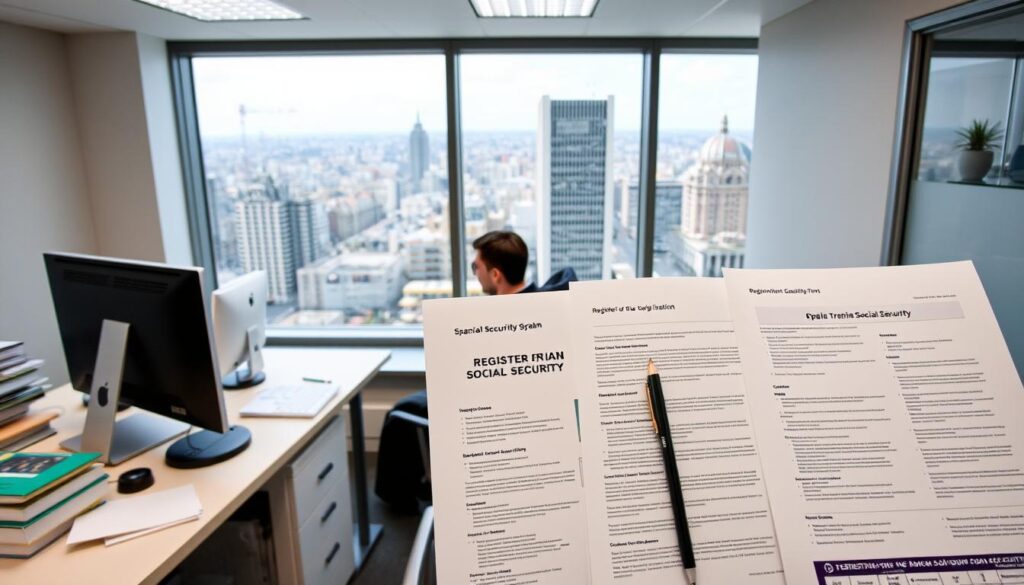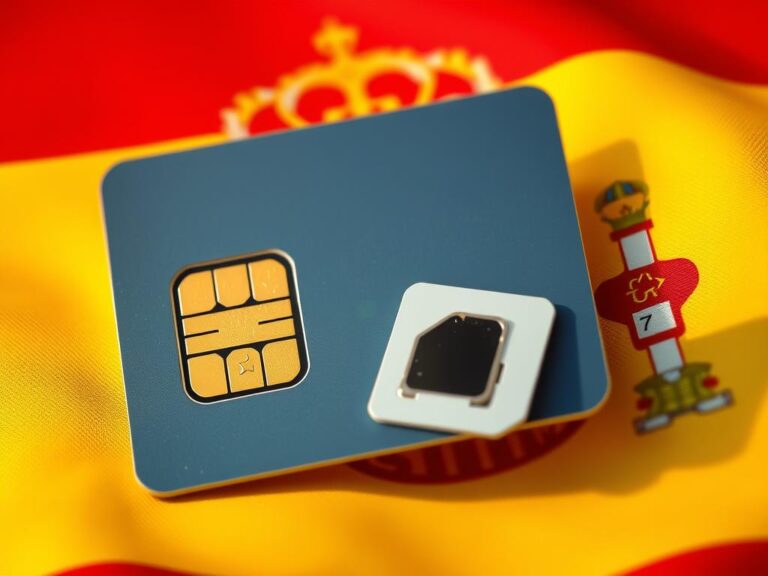Remote Working in Spain: How to Register for Health, Social Security & NIE
Thinking about working remotely from Spain? Not sure what steps to take? It doesn’t matter if you’re from the EU or not. Working remotely in Spain for an EU company has its own rules and taxes to consider.
As a remote worker, you’ll need to navigate the complexities of registering for a NIE, social security, and health insurance. You’ll have to understand the tax and legal rules for remote workers in Spain.
By following the right steps, you can make the move to remote working in Spain easy. In this article, we’ll show you how to do it.
Key Takeaways
- Understand the tax implications of remote working in Spain
- Learn how to register for a NIE as a remote worker
- Discover the requirements for social security and health insurance
- Navigate the legal requirements for remote workers in Spain
- Ensure a smooth transition to remote working in Spain
Understanding Spain’s Digital Nomad Visa and Remote Work Options
If you’re a remote worker thinking about Spain, you need to know about the Digital Nomad Visa. This visa is for non-EU workers who want to live in Spain while working for a company outside of Spain.
Overview of Spain’s Digital Nomad Visa Program
Spain’s Digital Nomad Visa program is a great option for remote workers. It lets you live in Spain while keeping your job with a foreign company. This visa is great for those who want to enjoy Spanish culture while keeping their job back home.
To apply, you’ll need to send in some documents. These include a valid passport, proof of income, and health insurance that covers you in Spain.
Benefits for Remote Workers and Digital Nomads
The Digital Nomad Visa has many perks. You can live in Spain, a country known for its culture and nice weather. Remote workers can enjoy the Spanish way of life while keeping up with their work.
- Reside in Spain legally with a valid visa.
- Access to Spain’s public healthcare system.
- Opportunity to integrate into Spanish culture.
- Potential tax benefits, depending on individual circumstances.
Legal Requirements for Working Remotely in Spain
To work remotely in Spain, you must follow certain legal rules. This includes registering with the right authorities and getting the needed documents.
| Requirement | Description |
|---|---|
| Valid Passport | Must be valid for at least six months beyond the intended stay in Spain. |
| Proof of Income | Demonstrate sufficient income to support oneself during the stay. |
| Health Insurance | Must cover the individual in Spain for the duration of their stay. |
Knowing these rules is key for a smooth transition to remote work in Spain.
What is the NIE and Why You Need It
The NIE, or Número de Identificación de Extranjero, is a key ID for foreigners in Spain. It’s needed for many official and legal tasks. This makes it a must-have for digital nomads and remote workers in Spain.
Definition and Purpose of the NIE Number
The NIE is a unique ID for foreigners in Spain. It’s needed for jobs, bank accounts, and property purchases. It helps track interactions with Spanish authorities and ensures tax and social security rules are followed.
Getting an NIE is a key step for anyone wanting to work or do business in Spain. It’s required for both locals and visitors who need to deal with the Spanish government.
Activities Requiring an NIE in Spain
Many activities in Spain need an NIE. These include:
- Working as a remote worker or digital nomad
- Opening a Spanish bank account
- Buying or selling property
- Signing a rental agreement
- Registering with the social security system
These tasks show why getting an NIE is important for living and working in Spain.
Difference Between NIE, NIF, and TIE
It’s important to know the differences between NIE, NIF, and TIE:
- NIE (Número de Identificación de Extranjero): Identification number for foreigners.
- NIF (Número de Identificación Fiscal): Tax identification number, mainly for tax use by residents.
- TIE (Tarjeta de Identidad de Extranjero): Foreigner’s identity card, which includes the NIE number and is mandatory for certain foreigners residing in Spain.
The NIE is a number for foreigners’ ID. The TIE is a card that some foreigners must carry. The NIF is focused on tax ID.
How to Register for NIE in Spain: Step-by-Step Process
If you’re moving to Spain, getting an NIE is key. The NIE, or Número de Identidad de Extranjero, is a unique ID needed for many tasks in Spain.
Required Documents for NIE Application
To get an NIE, you’ll need some documents. These include:
- A valid passport or identity document
- Proof of residence in Spain or the province where you’re applying
- A completed NIE application form (Modelo 790 or EX-15 for digital nomads)
- In some cases, additional documentation may be required, such as proof of income or a power of attorney if you’re using a representative
Where to Submit Your Application
You can apply for an NIE at a Spanish embassy or consulate if you’re outside Spain. Or, you can apply at a designated office in Spain. If you’re already in Spain, the Oficina de Extranjeros or a local police station can accept your application.
Processing Times and Fees
The time it takes to process an NIE application varies. It can take a few weeks to a few months. There’s also a fee for the application, so check the current fee before you apply.
To make your application smooth, check the specific requirements for your situation. Digital nomads and remote workers need the right documents.
NIE Appointment Booking in Spain: Tips and Tricks

Booking an NIE appointment in Spain can be tough. But, knowing the system helps a lot. Being ready and informed is key to success.
Online Booking System Navigation
The online system for NIE appointments is on the Spanish government’s website. To use it well:
- Have all your documents ready before you start.
- Be ready to enter your personal info and why you need an NIE.
- Pick where you want to go and when for your appointment.
Tip: Keep an eye on the website for new slots. Sometimes, people cancel and you can get in.
Alternative Booking Methods
If the online system doesn’t work, try other ways:
- Call the Spanish embassy or consulate to see if they have spots.
- Use a local helper or gestor to book for you.
“A local representative can make booking an NIE appointment much easier, even if you don’t know the Spanish system well.” –
Dealing with Limited Appointment Availability
When there aren’t many appointments, it’s tough. Here’s how to deal with it:
| Strategy | Description |
|---|---|
| Flexibility with Dates | Be open to different dates and times for your appointment. |
| Regular Checks | Check the booking system often for new spots. |
| Alternative Offices | Look into booking at a different office location. |
By using these tips and knowing the system, you can get an NIE appointment in Spain.
NIE Process for Digital Nomads and Remote Workers
Getting an NIE number in Spain is more than a formality. It’s a key to unlocking many opportunities. As a digital nomad or remote worker, you face unique challenges in Spain’s bureaucracy.
Special Considerations for Digital Nomads
Digital nomads and remote workers have special NIE application needs. You might need to provide extra documents to prove your remote work status.
Key documents often include:
- Proof of employment or a contract showing your remote work arrangement
- Business registration documents if you’re self-employed
- Evidence of income or financial stability
Documentation Proving Remote Work Status
To prove your remote work status, you’ll need to gather specific documents. This may involve:
- Getting a certificate from your employer or a letter explaining your remote work arrangement
- Providing bank statements or invoices that show your income source
- Registering your business (if applicable) and getting the right tax documents
Make sure all documents are up-to-date and translated into Spanish if needed.
Common Challenges and Solutions
Digital nomads often face challenges like:
- Limited appointment availability for NIE registration
- Difficulty in getting the required documents
- Language barriers during the application process
Solutions include:
- Booking appointments well in advance or using alternative booking methods
- Seeking help from relocation services or legal advisors for document preparation
- Using translation services or hiring a local representative to assist with the application
By understanding these challenges and preparing well, you can make your NIE application process smoother as a digital nomad or remote worker in Spain.
Spain Social Security Registration for Foreigners: Complete Guide

Remote workers need to register with Spain’s social security system to live legally and safely in the country. This step is key for getting healthcare and other benefits Spain offers to its residents.
Understanding the Spanish Social Security System
The Spanish social security system, or “Seguridad Social,” offers many benefits like healthcare, unemployment help, and pensions. It’s important for remote workers in Spain to know how to register and understand the system.
The system is run by the Tesorería General de la Seguridad Social (TGSS). They handle the registration and collect social security contributions.
Key Benefits of Registering with Spanish Social Security:
- Access to public healthcare services
- Eligibility for unemployment benefits if needed
- Contribution to a pension scheme
Registration Process with TGSS (Tesorería General de la Seguridad Social)
To register with the TGSS, you must follow a few steps. You’ll need to submit documents and fill out forms.
- Get the right application form (TA.1 or TA.2, depending on your situation).
- Fill out the form correctly, making sure all info is right.
- Send the form and needed documents (like your NIE number, passport, and address proof) to the TGSS office or an authorized person.
Check the TGSS website for the latest on documents and instructions for foreigners.
Obtaining Your Social Security Number
After registering, you’ll get a social security number, or “número de la Seguridad Social.” This number is vital for healthcare, making contributions, and getting social security benefits.
To get your number, make sure your application is complete and you’ve given all needed documents. The time it takes to process can vary, so apply early.
Getting social security in Spain as a foreigner is easy if you have the right info and follow TGSS steps. This way, you can access important services and benefits while in Spain.
How to Register for Health Insurance in Spain as a Remote Worker
To enjoy Spain’s top-notch healthcare, remote workers must sign up for health insurance. This process is easier with the right help. Spain’s healthcare is among the best in Europe, making it great for digital nomads and remote workers.
Public Healthcare Registration Process
Signing up for Spain’s public healthcare is easy for remote workers. First, get a health card, or “tarjeta sanitaria.” You’ll need to register with local authorities and show your NIE number, proof of residence, and income or financial resources.
The steps to register are:
- Collect your passport, NIE number, and proof of residence.
- Go to the local health department or a designated office.
- Fill out the form and submit it with your documents.
- Get your health card, usually in a few weeks.
Private Health Insurance Options and Requirements
Spain also has a strong private healthcare system. Private insurance can offer quicker service and access to private hospitals.
When picking a private insurance, think about:
| Provider | Coverage | Cost |
|---|---|---|
| Adeslas | Comprehensive coverage including dental and optical | €80-€150 per month |
| Mapfre | Basic coverage with optional add-ons | €60-€120 per month |
| Sanitas | Wide network of providers, includes specialist care | €100-€200 per month |
Healthcare Coverage for Digital Nomads
Digital nomads have special healthcare needs. Spain lets them join the public system if they’re residents. But, non-residents might need international private insurance.
Digital nomads should know Spain’s healthcare rules. Having the right insurance is key for peace of mind and financial safety.
Tax Implications for Remote Workers in Spain

Remote workers in Spain face several tax issues. These include rules on residency and international agreements. Knowing these is key for following the law and planning your finances.
Tax Residency Rules and Thresholds
In Spain, your tax status depends on how long you stay. If you’re here for over 183 days in a year, you’re a tax resident. This rule applies to everyone, locals and foreigners alike.
Key factors that determine tax residency include:
- The location of your family’s core nucleus (spouse, children)
- Whether you have a habitual abode in Spain
Keeping track of your days in Spain is important. Even if you’re not a tax resident, you might have to file taxes under certain conditions.
Double Taxation Agreements with the US
Spain and the US have a Double Taxation Agreement (DTA). This agreement stops you from being taxed twice on the same income.
Key aspects of the DTA include:
- Residency tie-breaker rules to determine your tax residency
- Exemption from taxation in one country if the income is taxed in the other
- Special considerations for certain types of income, such as dividends and royalties
Understanding the DTA is vital for remote workers. It helps avoid double taxation and use tax credits.
Filing Obligations for American Expats
As an American expat working remotely in Spain, you have specific filing duties. You must file a tax return with the IRS, reporting all your income worldwide.
Filing requirements include:
- Reporting foreign bank accounts if the aggregate value exceeds $10,000
- Claiming foreign earned income exclusion (if eligible)
- Reporting certain foreign financial assets
It’s wise to talk to a tax expert. They can help you follow both Spanish and US tax laws. International tax rules can be hard to understand.
Setting Up as an Autónomo (Self-Employed) in Spain
If you work remotely in Spain, you might need to register as an autónomo. This is to follow Spanish tax laws and social security rules. “Registering as an autónomo is a key step for many digital nomads and remote workers,” says a tax expert in Spain.
Registration Process for Freelancers
To register as an autónomo, you must follow a certain process. First, get a NIE (Número de Identificación de Extranjero), a foreigner’s ID in Spain. Then, register with the Spanish tax authorities and get your autónomo registration.
The process has several steps:
- Filling out the registration form (Modelo 036 or 037)
- Submitting the form to the relevant authorities
- Paying the required registration fees
Social Security Contributions for Autónomos
As an autónomo, you must make social security contributions. These contributions give you access to Spain’s public healthcare and other social benefits. The amount you contribute depends on your income and other factors.
It’s important to know that as an autónomo, you’re self-employed. Not making these contributions can lead to penalties.
Tax Benefits and Deductions
Being an autónomo in Spain offers tax benefits and deductions. You can deduct business expenses from your taxable income. This can greatly reduce your tax liability.
Some common deductions include:
| Expense Category | Description | Potential Deduction |
|---|---|---|
| Home Office | Expenses related to using a dedicated space for work | Up to 30% of rent or mortgage interest |
| Travel Expenses | Costs incurred while traveling for business | Actual costs or a per diem rate |
| Professional Fees | Fees paid to professionals like lawyers or accountants | Full amount of fees paid |
As an autónomo, it’s vital to keep accurate records of your business expenses. Consulting with a tax professional can help ensure you’re taking advantage of all eligible deductions.
“Understanding the tax implications and benefits of being an autónomo in Spain can significantly impact your financial situation,” notes a financial advisor.
Banking and Financial Setup for Remote Workers

As a remote worker in Spain, getting a local bank account is key. It makes handling money easier and helps with taxes and social security.
Opening a Spanish Bank Account
Getting a Spanish bank account is easy. Banks in Spain have services for foreigners, including remote workers. You’ll need:
- Your passport or national ID card
- Proof of address in Spain (utility bill or rental agreement)
- NIE (Número de Identificación de Extranjero) number
- Proof of income or employment contract
Some banks might ask for more, so check first. Banks like Santander, BBVA, and N26 are good for expats and remote workers. They have easy-to-use online banking.
Managing International Payments
Handling payments from abroad is key for remote workers. You’ll need to figure out how to get paid from clients overseas. Banks offer international payment services, but they can be pricey.
To save money, use services like TransferWise or PayPal. They often have better rates and lower fees than banks.
Currency Exchange Considerations
When you deal with international money, exchange rates matter. Changes in rates can impact your earnings. To handle this:
- Use a multi-currency account to manage different currencies.
- Set up a currency hedge to protect against rate changes.
- Transfer money regularly to avoid big losses from rate changes.
Knowing these financial tools can help you manage your money better as a remote worker in Spain.
Common Challenges and Solutions for Remote Workers in Spain
Spain is a great place for remote work, but you might face some challenges. Knowing these challenges and how to solve them can make your experience better.
Language Barriers and Resources
One big challenge is the language barrier. While many Spaniards speak English, not speaking Spanish can make things harder.
To get around this, you can:
- Take Spanish courses made for foreigners.
- Use apps like Duolingo or Babbel to learn.
- Practice with locals who want to help.
Dealing with Spanish Bureaucracy
Spanish bureaucracy can be tough, even for locals. Tasks like getting an NIE number or setting up social security can be overwhelming.
To handle this well:
- Do your research: Know what you need before you start.
- Get help from a professional: A gestor can guide you through the system.
- Stay organized: Keep your documents in order and meet deadlines.
Building a Professional Network
Having a professional network is key for finding work, collaborating, and getting support. Spain has a growing community of remote workers and digital nomads.
| Networking Opportunities | Description | Location |
|---|---|---|
| Coworking Spaces | Shared workspaces for professionals | Major cities like Madrid, Barcelona, and Valencia |
| Networking Events | Meetups, conferences, and workshops | Various cities, often announced on social media |
| Online Communities | Social media groups and forums for remote workers | Global, with local chapters |
By understanding these challenges and using these solutions, you can improve your remote work experience in Spain. Whether it’s language barriers, bureaucracy, or networking, being ready is essential for success.
Conclusion: Successfully Establishing Your Remote Work Setup in Spain
You’ve started your journey to work remotely in Spain. Now, you’re ready to set up your workspace. By following the steps in this article, you can make your remote work setup in Spain a success. This ensures you follow local rules and get the services you need.
You’ve learned how to get an NIE number and join the Spanish Social Security system. You also know how to get public healthcare and private insurance. Plus, you understand tax rules and how to be an autónomo. With this info, you’re ready to handle the challenges of remote work in Spain.
As you get used to working remotely in Spain, stay organized and keep up with your setup. Check your registration and compliance often to avoid problems. This way, you can enjoy the perks of remote work in Spain while keeping your work running smoothly.







